Supporting Seniors Through Personalized Hybrid Recovery Programs
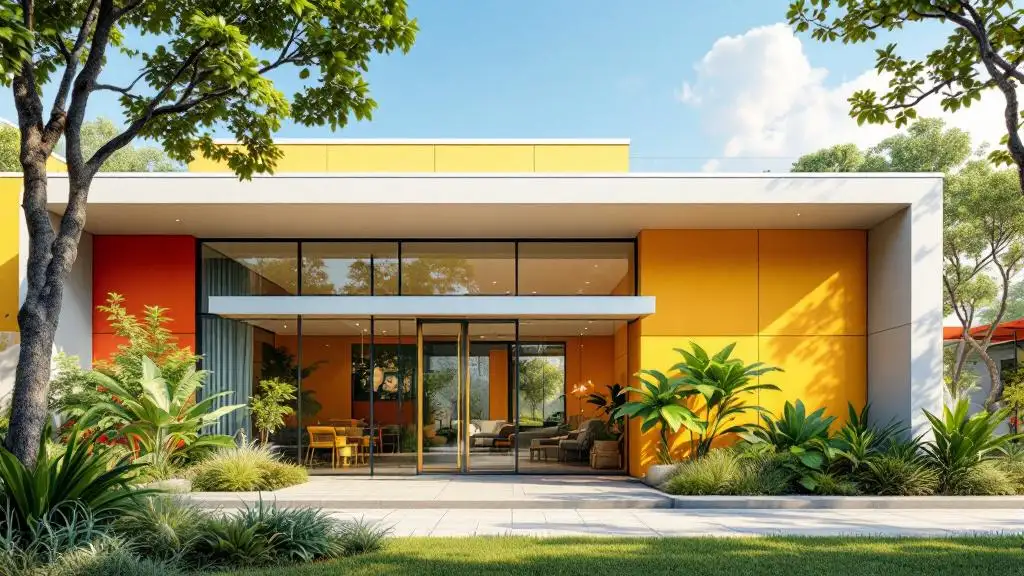
A New Horizon in Elder Care and Rehabilitation
As the aging population grows, so does the need for comprehensive, accessible, and personalized recovery programs tailored specifically for seniors. Hybrid recovery programs that blend in-person therapies with cutting-edge digital health technologies have emerged as a powerful solution, capable of addressing the unique physical, mental, and social needs of older adults. These innovative approaches are redefining senior care by fostering independence, promoting holistic well-being, and ensuring long-term recovery through adaptable, community-centered models.
Understanding Personalized Hybrid Recovery Programs for Seniors
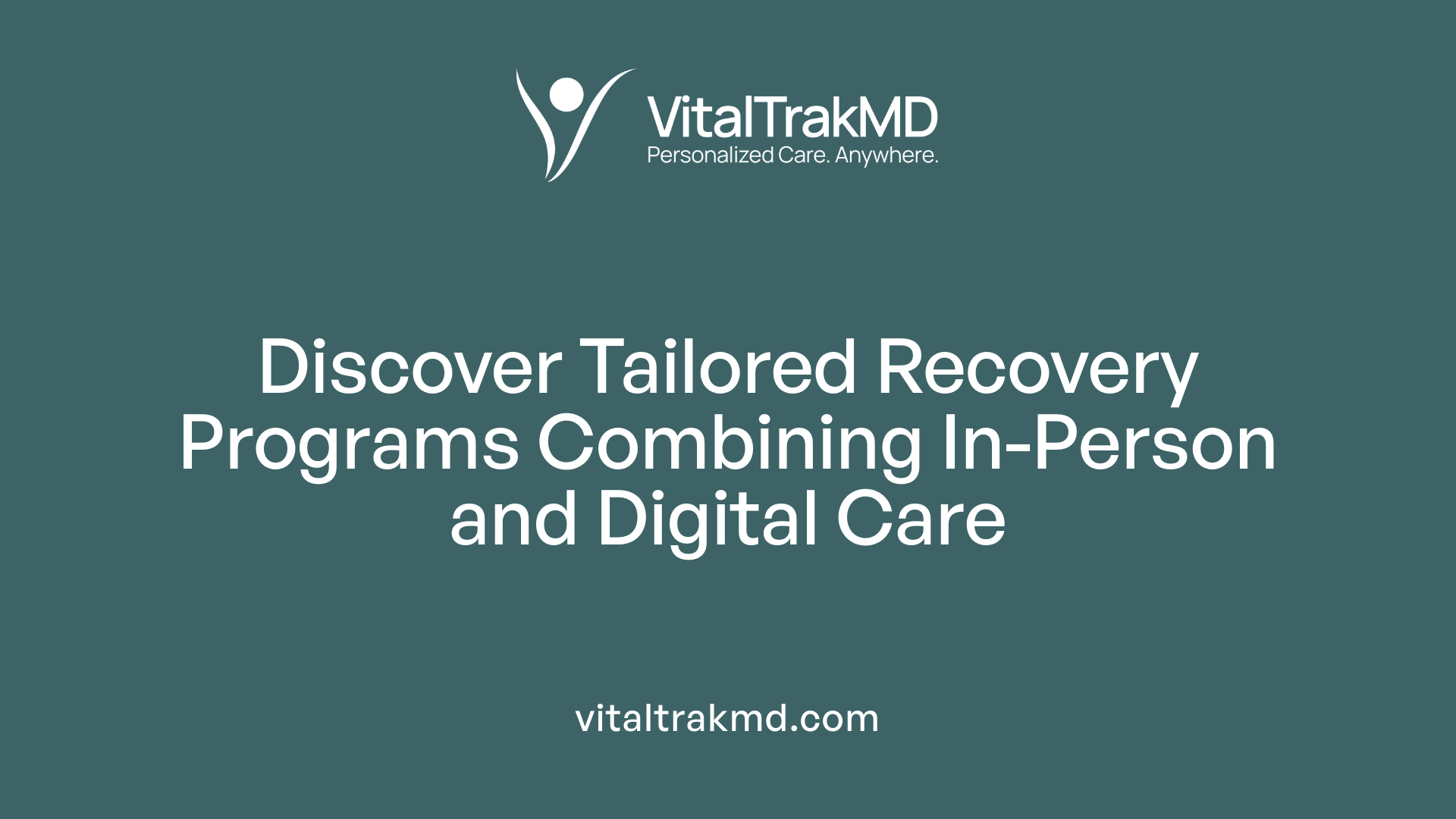 Personalized hybrid recovery programs for seniors are specially designed treatment plans that combine traditional in-person therapies with modern digital health tools. This approach aims to meet the unique needs of older adults facing health, mental health, or addiction challenges.
Personalized hybrid recovery programs for seniors are specially designed treatment plans that combine traditional in-person therapies with modern digital health tools. This approach aims to meet the unique needs of older adults facing health, mental health, or addiction challenges.
These programs are tailored to each individual, taking into account their physical health, mental wellness, social relationships, and life transitions such as retirement or grief. For example, the 55Plus Hybrid Recovery Program offers a mix of face-to-face sessions in Wayzata, MN, alongside virtual meetings, making it easier for elders to access support from any location.
A typical plan includes various therapies like counseling, medication management, and peer support groups, all focused on holistic recovery. It also emphasizes emotional and spiritual growth, fostering a sense of community and purpose.
The digital aspect involves telehealth services, remote monitoring through wearable devices, and online resources, which help maintain continuous care. Technologies such as virtual reality, gamification, and digital libraries increase engagement and motivation, especially important for seniors.
Flexibility is a crucial feature of these programs. Recovery plans are adaptable, allowing adjustments based on progress or changing needs. This makes them sustainable and supportive over the long term.
Overall, personalized hybrid recovery programs serve as comprehensive solutions that integrate physical, emotional, and social healing for older adults. By combining in-person experiences with innovative digital support, they provide accessible, effective pathways toward lasting recovery.
Benefits and Advantages of Hybrid Approaches for Older Adults
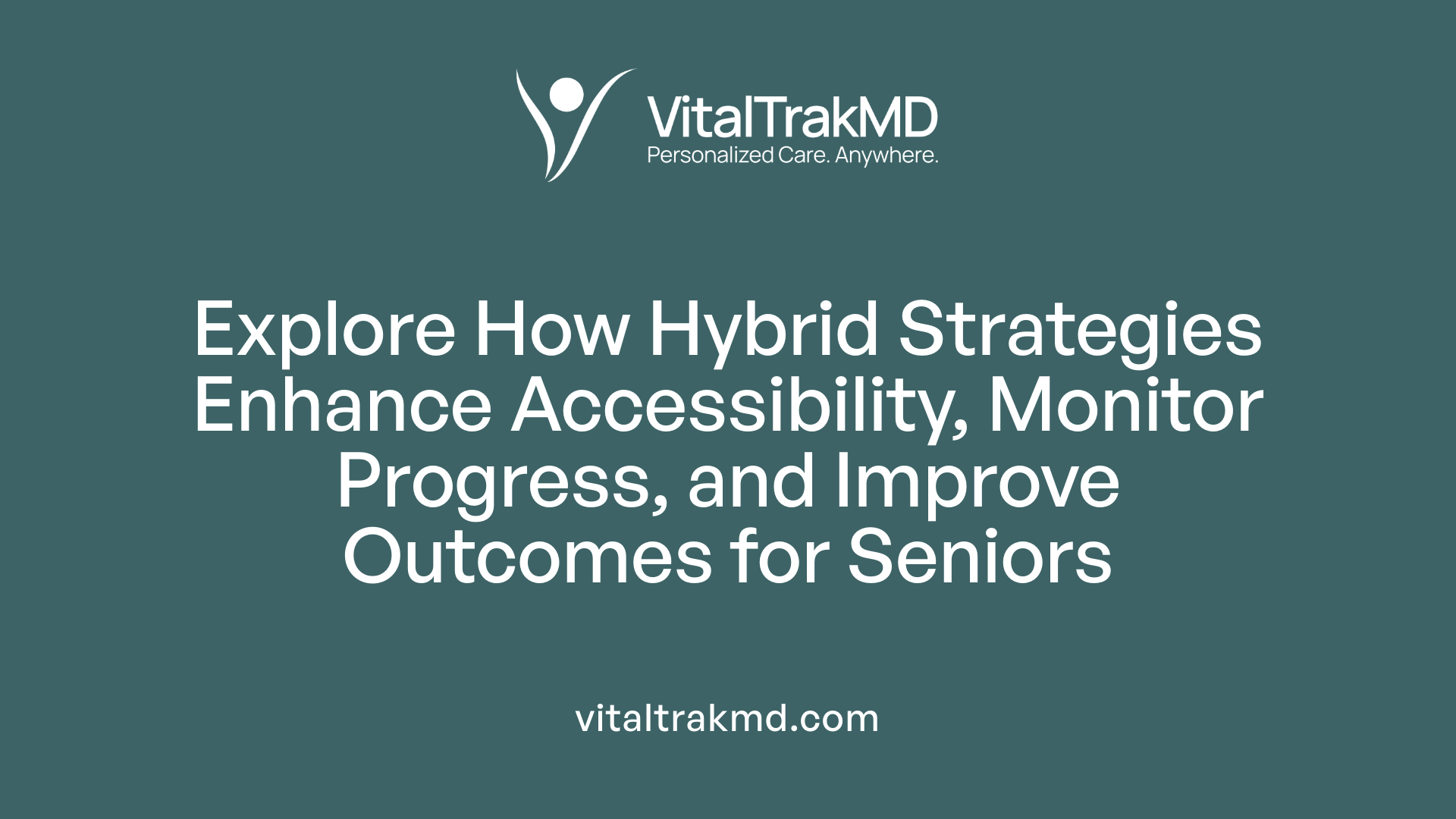 Hybrid recovery programs combine in-person and virtual care, offering significant advantages for older adults seeking support. These approaches enhance accessibility by allowing seniors to participate from anywhere, whether at community centers or from their homes, making it easier to maintain consistent engagement.
Hybrid recovery programs combine in-person and virtual care, offering significant advantages for older adults seeking support. These approaches enhance accessibility by allowing seniors to participate from anywhere, whether at community centers or from their homes, making it easier to maintain consistent engagement.
Through comprehensive, ongoing assessments—including functional and frailty evaluations—these models enable tailored interventions that can address physical limitations and prevent decline. By supporting multiple health domains such as physical, nutritional, cognitive, and social well-being, hybrid programs foster holistic care. This integrated approach helps seniors build confidence, self-efficacy, and social connections, which are vital for mental health and quality of life.
Additionally, continuous monitoring tools like wearable sensors and remote health tracking allow for real-time data collection. This facilitates personalized adjustments to care plans, ensuring interventions remain effective and responsive to changing needs. Overall, hybrid recovery strategies promote proactive, personalized, and holistic care, leading to improved health outcomes, greater independence, and a stronger sense of community among older adults.
Core Components and Services in Senior Hybrid Rehabilitation Programs
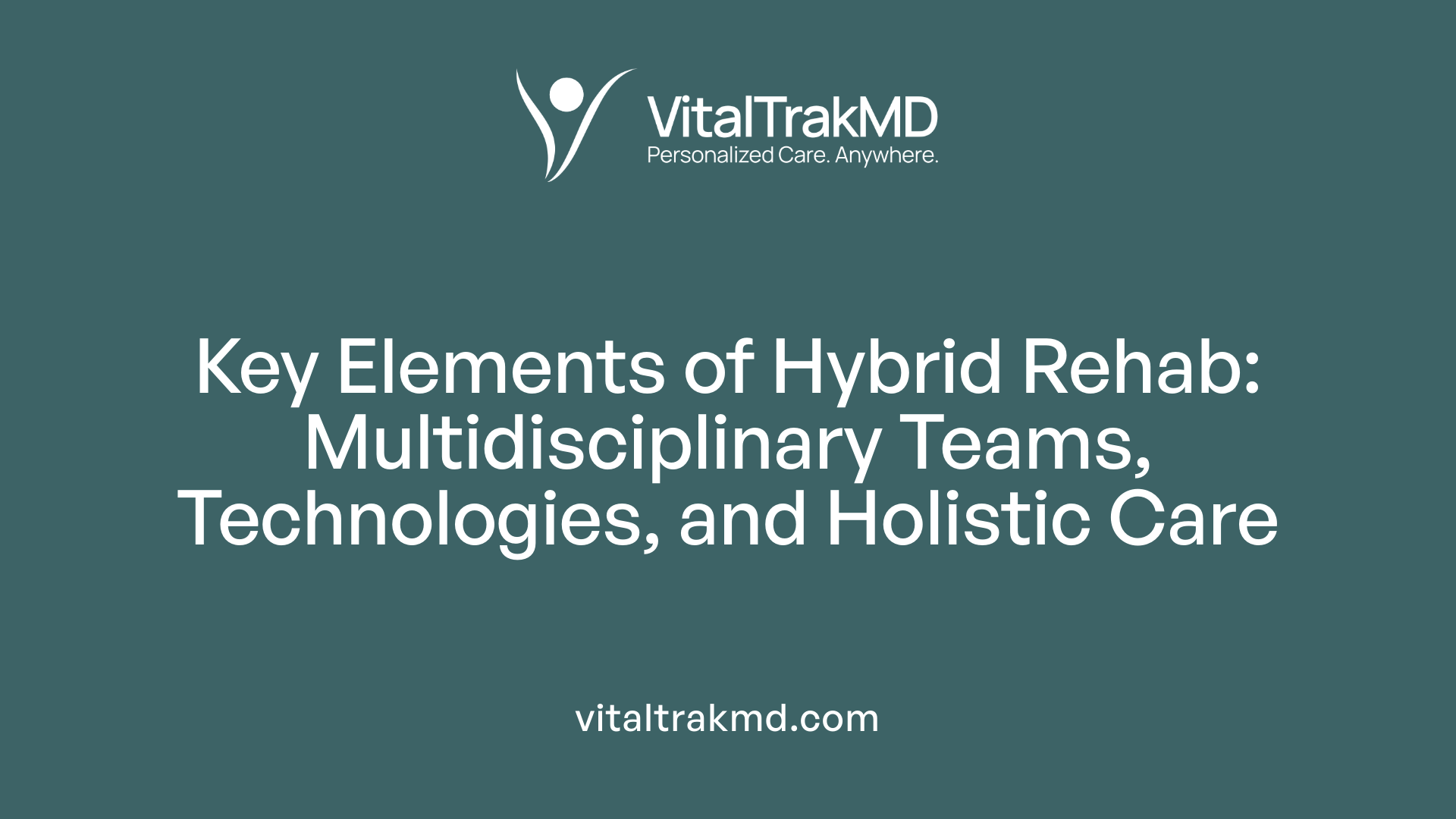 What components and services are involved in senior-focused hybrid rehabilitation programs?
What components and services are involved in senior-focused hybrid rehabilitation programs?
Senior hybrid rehabilitation programs are designed to provide comprehensive, tailored care for older adults. These programs typically involve a team effort, bringing together various healthcare providers to meet the diverse needs of seniors. This multidisciplinary care team may include physicians, physical therapists, occupational therapists, speech therapists, mental health specialists, and case managers.
A hallmark of these programs is the personalized approach to therapy. Each plan is customized to address specific health issues such as mobility limitations from neurological injuries, age-related musculoskeletal conditions, or cardiopulmonary health. These plans encompass physical exercises, cognitive training, emotional support, and lifestyle modifications tailored to individual needs.
In addition to in-person treatments, senior hybrid programs leverage telehealth consultations, allowing participants to access healthcare remotely. Remote monitoring technologies, such as wearable sensors and health tracking devices, facilitate continuous supervision of vital signs, activity levels, and recovery progress, helping clinicians promptly identify and address issues.
Holistic services are a core part of these programs. Nutritional guidance from dietitians ensures diets support recovery and overall health. Wellness activities that promote emotional resilience, such as mindfulness or peer support groups, help maintain mental well-being. Access to specialized rehabilitation facilities and equipment—like gait trainers, robotic devices, and virtual reality setups—further supports mobility and engagement.
Overall, the aim of senior hybrid rehabilitation is to promote independence, improve physical and cognitive function, and foster a higher quality of life through an integrated mix of physical therapies, mental health support, technological innovations, and holistic care. These programs strive to adapt to each older adult’s unique circumstances, ensuring they receive effective, accessible, and comprehensive rehabilitation.
| Components | Services and Technologies | Targeted Conditions |
|---|---|---|
| Multidisciplinary Team | In-person therapy, telehealth | Neurological, musculoskeletal, cardiopulmonary |
| Personalized Therapy | Cognitive training, physical exercises | Age-related physical decline, neurological injuries |
| Remote Monitoring | Wearable sensors, health apps | Chronic disease management, recovery progress |
| Holistic Support | Nutritional counseling, emotional resilience activities | Mental health, nutrition, overall wellness |
| Specialized Equipment | Robotic devices, virtual reality | Mobility issues, motivation for exercises |
For individuals seeking advanced, individualized care, senior hybrid programs offer an effective combination of technology-driven and human-centered interventions to support long-term health and independence.
Technological and Innovative Frameworks Supporting Senior Recovery
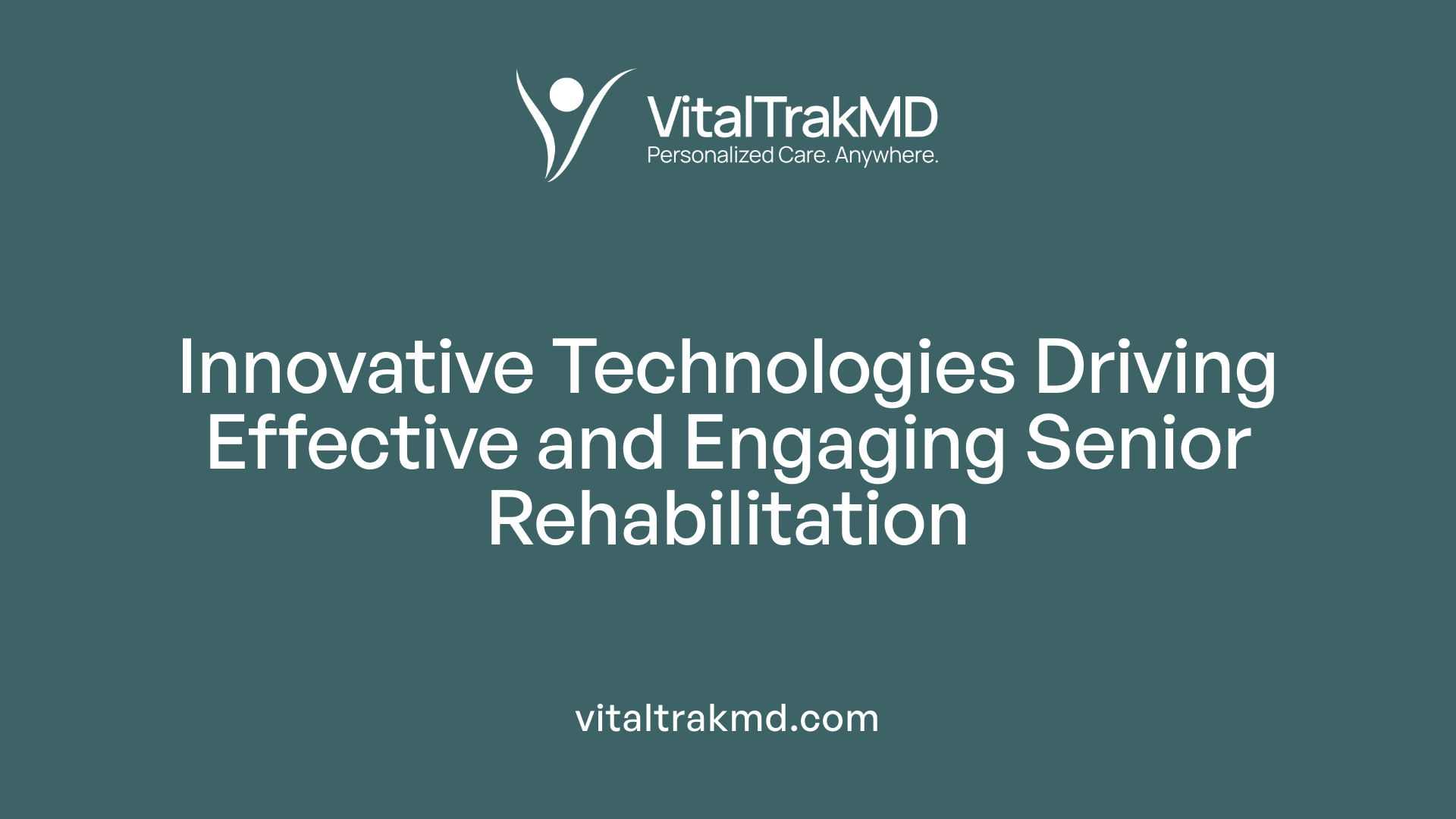
What innovative methods or frameworks are used in senior rehabilitation systems?
In recent years, senior rehabilitation has increasingly embraced cutting-edge technologies and comprehensive frameworks to improve recovery outcomes. One prominent approach involves the use of virtual and augmented reality (VR/AR), which creates immersive environments that motivate seniors during physical and cognitive exercises. These tools make rehabilitation more engaging and adaptable to individual progress.
Wearable sensors and robotics also play vital roles. Wearable devices monitor vital signs and movement patterns continuously, providing real-time data to healthcare providers. Robotic devices, such as exoskeletons and gait trainers, assist with mobility and strength rebuilding, especially after strokes or neurological injuries.
Artificial intelligence (AI) and brain-computer interfaces enable personalized therapy plans. AI algorithms analyze data from sensors to adapt exercises to each senior's needs, fostering tailored interventions that optimize recovery.
Non-invasive brain stimulation techniques like transcranial direct current stimulation (tDCS) are used to enhance neural plasticity, aiding cognitive and physical rehabilitation. Combined with cognitive training platforms, these methods target memory, attention, and problem-solving skills.
Telehealth platforms extend care beyond clinics. They facilitate remote monitoring, virtual consultations, and continuous therapy, ensuring support during and after formal treatment. These platforms often integrate digital content libraries, enabling seniors to practice exercises at home with guidance.
Holistic frameworks such as the World Health Organization (WHO) Rehabilitation Competency Framework and the International Classification of Functioning, Disability and Health (ICF) promote standardized, person-centered, and collaborative care models. They emphasize multidisciplinary teamwork—combining physical therapists, mental health specialists, nutritionists, and social workers—to provide comprehensive support.
Developments in smart systems leverage digital assistants, remote diagnostics, and personalized support tools. For example, smart home devices and digital health monitors help seniors maintain independence and safety.
Together, these technological and conceptual innovations aim to improve functional independence, mental health, and quality of life for older adults with diverse health conditions, offering a more effective and engaging pathway to recovery.
The Role of Healthcare, Therapy, and Mental Health Support in Recovery
 Healthcare, therapy, and mental health services play a crucial part in supporting seniors’ recovery from addiction, mental health issues, and overall health challenges.
Healthcare, therapy, and mental health services play a crucial part in supporting seniors’ recovery from addiction, mental health issues, and overall health challenges.
Multidisciplinary teams are often involved, including doctors, mental health professionals, social workers, and recovery specialists. These teams work together to craft personalized care plans that address both physical health and emotional well-being.
In senior recovery programs, interventions such as medication management, individual and group therapy, and peer support groups are common components. These treatments help manage co-occurring disorders—such as depression, anxiety, and substance use—and promote emotional resilience.
Addressing social factors like loneliness, isolation, and stigma is also essential. Programs often focus on building social connections through community activities, support groups, and intergenerational programs, ensuring a supportive environment.
Integrating mental health care within general healthcare settings enhances coordination, making it easier for seniors to receive comprehensive treatment. This approach also helps prevent hospital readmissions, reduce healthcare costs, and improve overall quality of life.
Ultimately, combining medical, psychological, and social supports fosters holistic recovery. It empowers older adults to regain independence, develop coping skills, and lead healthier, more connected lives.
The collaboration of these services not only improves health outcomes but also nurtures resilience, allowing seniors to navigate aging with dignity and confidence.
Transforming Senior Recovery for a Better Future
The evolution of personalized hybrid recovery programs exemplifies the innovative spirit and commitment to improving elder care. By leveraging technology, community resources, and multidisciplinary expertise, these programs foster sustainable recovery, independence, and enhanced quality of life for seniors. As healthcare continues to evolve, embracing such holistic, adaptable, and accessible models will be key to meeting the diverse needs of an aging population and ensuring that seniors receive the compassionate, comprehensive care they deserve.
References
- 55Plus Sober Recovery Program - The Retreat
- Personalized Recovery Oriented Services (PROS)
- Hybrid e-rehabilitation services: SMART-system for remote ...
- Programs and Services - SPOP
- Advances in Long-Term Rehabilitation for Senior Citizens
- How Hybrid Programming is Transforming Senior Centers
- For Seniors - NYC
- Hybrid model of care for older persons for improvement ...
Recent articles
Want to Feel Better and Live Healthier?
Join hundreds of patients taking control of their health with personalized care that fits their life – not the other way around.
Rated 4.8/5 by 32+ customers







